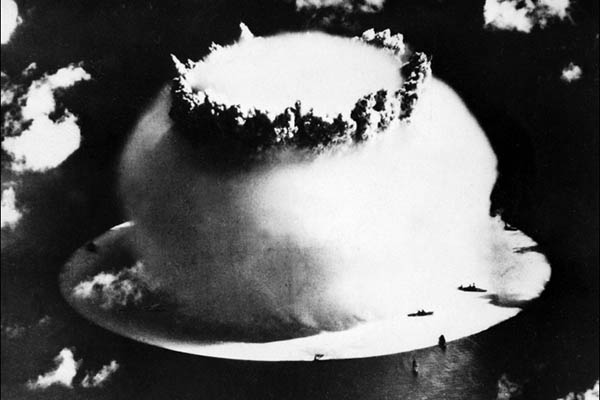
AFP
International Court of Justice upholds objection to jurisdiction, citing no evidence of prior dispute or bilateral negotiations.
The U.N.’s highest court on Wednesday narrowly threw out landmark cases brought by the tiny Marshall Islands against India, Pakistan and Britain for allegedly failing to halt the nuclear arms race.
In majority decisions, the 16-judge bench at the International Court of Justice (ICJ) ruled there was no evidence that Majuro had had a prior dispute with any of the three nuclear giants or sought bilateral negotiations on the issue. “The court upholds the objection to jurisdiction” raised by each of the countries, presiding judge Ronny Abraham said in separate rulings, and therefore the tribunal “cannot proceed to the merits of the case.”
The tiny Pacific island nation was ground zero for a string of devastating nuclear tests on its pristine atolls between 1946-58, carried out by the United States as the Cold War arms race gathered momentum. After the hearings at the tribunal based in The Hague, the Marshalls said it will now “study the ruling” which is final and without appeal.
“Obviously it’s very disappointing,” Marshall Islands lawyer Phon van der Biesen told reporters.
Initially in 2014, Majuro had accused nine countries of failing to comply with the 1968 nuclear Non-Proliferation Treaty, which seeks to inhibit the spread of atomic bombs. But the ICJ already refused to take up cases against the other countries—China, France, Israel, North Korea, Russia and the United States—as they have not recognized the court’s jurisdiction.
Israel has also never formally admitted to having nuclear weapons.
The Marshall Islands had argued that by not stopping the nuclear arms race Britain, India and Pakistan had breached obligations under the treaty—even if New Delhi and Islamabad have not signed the pact.
The treaty commits all nuclear weapon states “to pursue negotiations in good faith on effective measures relating to cessation of the nuclear arms race at an early date and to nuclear disarmament.”
At a March hearing, Majuro’s lawyers painted a vivid picture of the horrors seen after 67 nuclear tests were carried out on Bikini and Enewetak atolls. “Several islands in my country were vaporized and others are estimated to remain uninhabitable for thousands of years,” Tony deBrum, a former Marshall Islands foreign minister, told the court.
The so-called “Operation Castle” tests in March and April 1954 were particularly devastating and resulted in massive contamination because of the nuclear fall-out. “The entire sky turned blood-red,” said deBrum, who witnessed the explosion of the largest-ever U.S.-built nuclear device called “Castle Bravo” as a nine-year-old boy.
Critics have argued however that the ICJ action is a distraction and that the islanders’ real fight is with Washington, which carried out the tests in their backyard. They contend that the case has no relation to the victims’ claims for increased compensation, better health care and clean-ups to render the sites habitable again.
Experts however say the islands hoped the three cases before the ICJ will thrust nuclear disarmament talks, which have stalled over the past two decades, back into the spotlight. Even if the case has no direct impact, the Marshall Islands’ residents “perhaps feel that the more the difficulties with nuclear weapons are brought to the public consciousness, the better,” said Jens Iverson, assistant professor of Public International Law at Leiden University. “They may hope that the world may become a safer place,” Iverson told AFP.
